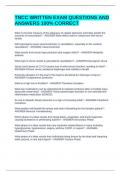TNCC WRITTEN EXAM QUESTIONS AND
ANSWERS 100% CORRECT
What is the best measure of the adequacy of cellular perfusion and helps predict the
outcome of resuscitation? - ANSWER-Base deficit used in conjunction with serum
lactate
Will hypocapnia cause vasoconstriction or vasodilation, especially in the cerebral
vasculature? - ANSWER-Vasoconstriction
What results from tissue hypo perfusion and oxygen deficit? - ANSWER-Metabolic
acidosis
What type of shock results in generalized vasodilation? - ANSWER-Neurogenic shock
Spinal cord injuries at C3-C5 causes loss of what nerves function, resulting in what? -
ANSWER-Phrenic nerve; paralyzed diaphragm and inability to breath
Extremity elevation AT the level of the heart is beneficial for what type of injury? -
ANSWER-Compartment Syndrome
What is a high risk of frostbite? - ANSWER-Thrombus formation
What two medications can be administered to maintain perfusion after a frostbite injury
along with rewarming? - ANSWER-Tissue plasminogen activator or non steroidal anti-
inflammatory medication (NSAIDS)
An rise in diastolic blood pressures is a sign of increasing what? - ANSWER-Peripheral
resistance
What position will benefit the airway and work of breathing for the bariatric patient? -
ANSWER-Reverse Trendelenburg
Which phase of a blast results from flying debris, projectiles, and bomb fragments
causing lacerations or penetrating injuries? - ANSWER-Secondary Phase
What phase of a blast results from any explosion-related illness or injury including
hyperglycemia, hypertension, angina, asthma, COPD, or sepsis? - ANSWER-
Quaternary Phase
What phase of a blast results from individuals being thrown by the blast and impacting
walls, ground, or any hard object? - ANSWER-Tertiary Phase
, What phase of a blast results from impact of the over and under pressurization wave
with body surfaces. Injuries include blast lung, tympanic membrane rupture, abdominal
hemorrhage, globe rupture, and mild traumatic brain injury? - ANSWER-Primary Phase
Signs of what include muscle pain or weakness, dark red or brown urine, general
weakness or malaise, and elevated creatinine kinase levels? - ANSWER-
Rhabdomyolosis
Signs of what include anxiety, pleuritic chest pain, dyspnea, hypoxemia, hemoptysis,
cough, orthopnea, adventitious lung sounds, decreased lung sounds, jugular vein
distention, or hypotension? - ANSWER-Pulmonary Embolus
Signs of what include headache, nausea and vomiting, amnesia, behavioral changes,
altered level of consciousness? - ANSWER-Increased intracranial pressure
Signs of what include asymmetric pupillary reactivity, unilateral dilation, widening pulse
pressure, abnormal motor posturing, bradycardia, and decreased respiratory effort? -
ANSWER-Late signs of increased ICP with Herniation Syndrome
What is caused by the tear of the bridging veins or middle meningeal artery? -
ANSWER-Subdural and Epidural Hematoma
What is pulsus paradoxus? And what is it a sign of? - ANSWER-Drop in blood pressure
with inspiration, sign of cardiac tamponade
Tachycarida, weak pulses, hypotension, cool periphery, delayed cap refill, anxiety and
agitation are signs of what type of shock? Seen with what? - ANSWER-Obstructive
Shock; Cardiac Tamponade
Persistent blood loss following chest tube insertion is a sign of what? - ANSWER-
Hemothorax
Ipsilateral diminished breath sounds and chest movement is a sign of what? -
ANSWER-Hemothorax
Tearing chest/back pain, unequal blood pressure and pulses are a sign of what?
Caused by a high mechanism of injury. - ANSWER-Thoracic Aortic Disruption
Affect concentration, memory, sleep, mode, and libido. Causes headaches, dizziness
and nausea. - ANSWER-Postconcussive Syndrome/ Mild Traumatic Brain Injury
Signs and symptoms similar to early signs of increased ICP but do not worsen. -
ANSWER-Postconcussive Syndrome/ Mild Traumatic Brain Injury
Cerebral Perfusion Pressure = ______-______ - ANSWER-MAP - ICP




